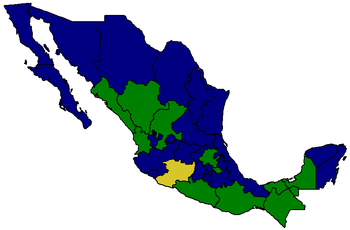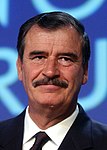Mexican presidential election, 2000
|
|
|||||||||||||||||||||||||
|---|---|---|---|---|---|---|---|---|---|---|---|---|---|---|---|---|---|---|---|---|---|---|---|---|---|
|
|||||||||||||||||||||||||
|
|||||||||||||||||||||||||

States won by the presidential candidates (blue for Fox, green for Labastida and yellow for Cárdenas)
|
|||||||||||||||||||||||||
|
|||||||||||||||||||||||||
General elections were held in Mexico on Sunday, July 2, 2000. Voters went to the polls to elect, on the federal level:
Several local ballots were also held on the same day, most notably:
This a historically significant election that made Fox the first president elected from an opposition party since Francisco I. Madero in 1910 and the first one in 71 years to defeat, with 42 percent of the vote, the then-dominant Institutional Revolutionary Party.
Despite some isolated incidents of irregularities and problems, such as one in the southern state of Campeche which involved the European Union electoral observer Rocco Buttiglione and which could have created problems for President Ernesto Zedillo had the PRI candidate won, there was little evidence that those incidents were centrally coordinated (as opposed to led by local PRI officials) and critics concluded that the irregularities that occurred did not alter the outcome of the presidential vote, which was more definitive than expected. Civic organizations fielded more than 80,000 trained electoral observers, foreign observers were invited to witness the process, and numerous "quick count" operations and exit polls (not all of them independent) validated the official vote tabulation. The largest exit poll was organized by the U.S. firm Penn, Schoen & Berland, financed by a hitherto obscure outfit in Dallas called Democracy Watch (later it emerged that Democracy Watch was essentially set up by Fox campaign insiders to help prevent an expected election fraud).
Numerous electoral reforms implemented since 1989 aided in the opening of the Mexican political system, and since then opposition parties made historic gains in elections at all levels. The chief electoral concerns shifted from outright fraud to campaign fairness issues and, between 1995 and 1996, the political parties negotiated constitutional amendments to address these issues. The legislation implemented included major points of consensus that had been worked out with the opposition parties. Under the new laws, public financing predominated over private contributions to political parties, procedures for auditing parties were tightened, and the authority and independence of the electoral institutions were strengthened. The court system was also given greatly expanded authority to hear civil rights cases on electoral matters brought by individuals or groups. In short, the extensive reform efforts of the 1990s "leveled the playing field" for the parties.
...
Wikipedia



